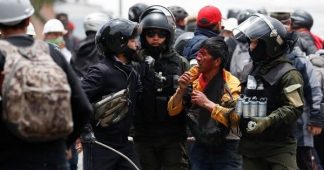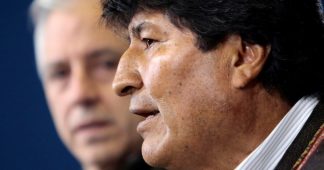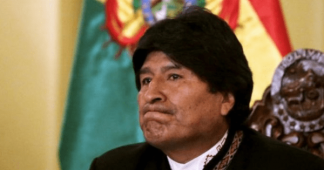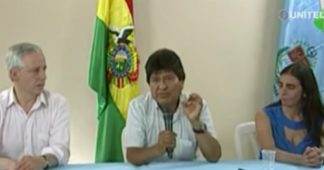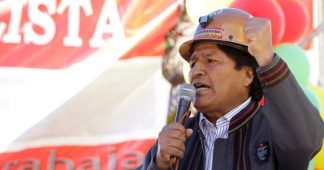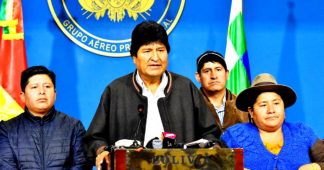By Andrea Lobo
12 November 2019
Bolivian president Evo Morales of the Movement Toward Socialism (MAS) party was forced to resign Sunday evening by the Bolivian military in a coup backed by the United States. Last night, Morales tweeted that he is “leaving for Mexico” after that country agreed to grant him asylum.
After three weeks of protests following the disputed October 20 presidential elections, the imperialist powers and their Bolivian client elite have overthrown the government of Morales. In the context of a deepening crisis of global capitalism and a resurgence of the class struggle internationally, including recent mass strikes among miners and doctors in Bolivia, the ruling class lost confidence that Morales and the MAS apparatus can continue to suppress social opposition.
Despite empty calls to “preserve democracy,” the US government is backing a takeover of the most racist and authoritarian Bolivian politicians and state officials to install a regime that will ruthlessly crackdown on opposition as global finance demands a full-blown exploitation of Bolivia’s vast and strategic oil and mining resources, including 70 percent of global lithium reserves.
Yesterday, US President Donald Trump released a statement celebrating the coup and applauding “the Bolivian military for “abiding by its oath to protect not just a single person, but Bolivia’s Constitution.” He then threatened the Venezuelan and Nicaraguan governments with the same fate, ending: “We are now one step closer to a completely democratic, prosperous and free Western Hemisphere.”
Pitched fighting took place last night as thousands of peasants and workers from El Alto and other regions surrounding La Paz mobilized in the capital to protest the coup, chanting “Now it’s time for civil war.” Several police buildings were occupied and then burned in El Alto.
The armed forces have responded by activating “Plan Sebastián Pagador” to restore “peace and stability,” which the police are enforcing by shooting protesters with volleys of live bullets and grenades.
The Mexican government agreed yesterday to Morales’s request for asylum after his house was burned down and an arrest warrant issued by the Bolivian police. The Mexican Foreign Ministry asked the same Bolivian authorities that overthrew Morales to provide a “safe passageway.” However, the governments of Argentina and Brazil said they would not allow Morales to use their airspace.
The head of the pro-Morales Supreme Electoral Tribunal (TSE) and several electoral officials were arrested Sunday, while about 20 MAS politicians have sought asylum in the Mexican embassy in La Paz.
Given the resignation of the presidents of the Senate and Chamber of Deputies along with Morales, the next in line will be the Senate vice president and opposition figure Jeanine Añez.
However, Luis Fernando Camacho, a far-right leader of the Santa Cruz Civic Committee —an organization led by business groups—who has become the de facto leader of the demonstrations, called for a “junta” including the military and police chiefs. The corporate media has gleefully branded Camacho “Bolivia’s Bolsonaro,” in reference to the Brazilian fascistic president.
Protests erupted across the country after the broadcast of electoral results stopped for 23 hours between Sunday and Monday evening October 20-21. During this period, Morales’s lead over Carlos Mesa in second place jumped from 7.87 percent to 9.36 percent. The TSE’s final result gave Morales 35,000 votes above the 10 percent lead needed to avoid a run-off.
Morales’s vote fell from 63 percent in the 2014 elections to 47 percent, while MAS lost 21 seats in the Chamber of Deputies and four seats in the Senate, keeping slight majorities.
Some sections of the working class participated in the initial protests amid widespread concerns over fraud; however, as the far-right character of the political parties and “civic committees” leading the protests became apparent, many workers dropped their support. For instance, medical professionals carried out a national strike, seeing the unrest as potential opportunity to rally popular support behind their demands against austerity, but the strike ended after only three days.
Clashes between protesters, government supporters and police have left three dead, 221 arrested and 383 injured, including several from gunshots. Pro-Morales trade union thugs were among those deployed against protesters, while far-right anti-Morales attackers were filmed beating up indigenous people. On November 7, demonstrators captured Patricia Arce, a MAS mayor in the small town of Vinto, blaming her for one of the killings. She was released after being drenched in red paint as protesters cut her hair.
Morales and MAS responded by inviting the Organization of American States (OAS), which had already demanded a second round before the final results, to carry out a “binding audit.” The main backer of the OAS, the US government, proclaimed that MAS had “stolen” the elections, while the European Union had also called for a second round.
Morales’s decision to allow the OAS to approve or disapprove the results meant placing the fate of his government in the hands of the US State Department. The audit began on Thursday, October 31.
On Monday, November 4, Morales’s helicopter had to make an immediate and emergency landing due to suspicious mechanical issues. On Friday and Saturday, entire police departments, including in the capital of La Paz, rioted and joined the anti-Morales protests. Then, on Sunday morning, the OAS released its preliminary report, alleging that 78 of the 333 recount processes “showed irregularities and manipulation” and that “the manipulations of the computer systems are of such magnitude that they must be deeply investigated by the Bolivian state.”
Without presenting the corresponding evidence, the OAS then called for new elections overseen by a new electoral commission. Shortly after, the US Secretary of State, Mike Pompeo, released a statement backing the OAS report and adding a statement directed against MAS: “In order to restore the credibility of the electoral process, all government officials and officials of any political organizations implicated in the flawed October 20 elections should step aside from the electoral process.”
Morales initially responded in a press conference by agreeing to new elections under a new electoral commission, without indicating if he would participate or when the elections would occur. Effectively, this meant that he would abide by any arrangement imposed by Washington.
The Bolivian Workers Central (COB), which constituted a central instrument in the MAS government, then called for Morales’s resignation. Significantly, the Peasant Trade Union Confederation (CSUTCB), which belongs to the COB and assembled some of the main indigenous leaders who backed Morales, demanded that Morales “rot in the Chonchocoro jail because this was a fraud and deception against the Aymara.”
Several ministers whose houses were set on fire and MAS deputies resigned. Then, Morales and Vice President Álvaro García Linera announced their resignations from the Chapare region in central Bolivia, where Morales began his political career as a trade unionist.
During his announcement, Morales denounced that he was being subjected to a “civilian and police coup,” and said he was resigning to avoid further violence and persecutions against his supporters and himself. At the same time, he said the OAS report was based on political, not technical considerations, but that he “understood” and “respected that.”
As demonstrated by its continued subservience to the demands of imperialism and its institutions like the OAS, any future role played by Morales, MAS and their apologists will be aimed at providing a democratic cover to the reality that Bolivian economic and political life are dominated by the US and European financial aristocracies and its military puppets in Bolivia, while there is no section of the Bolivian ruling class capable of fighting imperialism.
